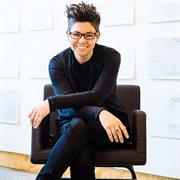
Professor Naomi Stead
Details
-
Department: Design and Social Context
-
Campus: City Campus Australia
-
naomi.stead@rmit.edu.au
-
ORCID: 0000-0002-0466-4432
Open to
- Masters Research or PhD student supervision
About
Professor Naomi Stead is a researcher and research leader working across the creative fields towards interdisciplinary research for social and environmental benefit.
Professor Naomi Stead is Associate Deputy Vice Chancellor Engagament in the College of Design and Social Context at RMIT. Throughout her academic career she has been committed to research-based advocacy - into gender equity and work-related wellbeing in creative workplaces, and ways in which creative practice and education can respond to the climate and biodiversity crisis. She has been recipient of three ARC grants, including her most recent project, 'Architectural Work Cultures: professional identity, education and wellbeing' (2021-2024) which explores the work-related wellbeing of architects and architecture students, and the earlier 'Equity and Diversity in the Australian Architecture Profession: Women, Work and Leadership,' which led to the founding of Parlour, an internationally recognized leader in research-based advocacy towards gender equity in the architecture profession.
Stead is known as an innovative and transdisciplinary scholar, with a particular focus on social benefit to marginalised groups, including the LGBTIQ+ community. She is interested in forms of reflexive and situated writing – in the academic, professional, and essayistic realms, and transdisciplinary methodological explorations - of experimental methods, critical and subversive methods, and creative and speculative methods. She is particularly interested in questions of subjectivity and positionality, embodiment and situatedness, in both academic and creative non-fiction forms of knowledge production. In terms of topics, her research interests are broad – addressing the cultural politics of the creative arts; cultures of production, mediation, and reception in the creative arts; and innovative writing and research methods, in architecture and beyond.
Stead has edited or co-edited six books, including After the Australian Ugliness (NGV & Thames and Hudson, 2020) with Tom Lee, Ewan McEoin, and Megan Patty which won the Art Association of Australia and NZ 'best anthology' award in 2022; Speaking of Buildings: Oral History in Architectural Research (Princeton Architectural Press 2019) with Janina Gosseye and Deborah van der Plaat; Writing Architectures: Fictocritical Approaches (Bloomsbury, 2020) with Hélène Frichot; and most recently Queering Architecture: Methods, Spaces, Practices, and Pedagogies (Bloomsbury, 2023) with Marko Jobst. She has also published prolifically elsewhere – and produced numerous Non-Traditional works including exhibition curation; industry reports and guides; book reviews and catalogue essays. In 2023 she was co-curator of Wild Hope: Conversations for a Planetary Commons, a major exhibition at RMIT Design Hub Gallery co-curated with Fleur Watson, Wendy Steele and Katrina Simon.
Stead has a significant profile as an architecture critic – culminating in her current roles as architecture critic for The Saturday Paper and featured contributor for the US-based Places Journal. She was formerly an architecture columnist for The Conversation. She was awarded the Bates Smart Award for Architecture in the Media for a series of essays published in The Saturday Paper throughout 2022.
Research fields
- 330104 Architectural history, theory and criticism
- 330304 Design history, theory and criticism
- 440501 Feminist and queer theory
- 360204 Site-based writing
- 3602 Creative and professional writing
- 440806 Gender and politics
- 350507 Workplace wellbeing and quality of working life
- 470204 Cultural and creative industries
Supervisor projects
- Who are you wearing?
- 1 Nov 2025
- ONE PUBLISHES TO FIND COMRADES: Critical Fashion Publishing, Publishing Critical Fashion Practice
- 1 Oct 2025
- Navigating Public Transport Spaces: Understanding Gender Diverse Urban Experiences
- 13 Mar 2025
- Practising Critical Socio-spatiality in Hanoi
- 13 Feb 2025
- From Building Platforms to Being a Platform: Recentering a Queer Critical Spatial Practice in Việt Nam
- 13 Jan 2025
- Unsettling the unsettled: Reframing dynamics between climate change, built environments and communities in Australia
- 1 Dec 2024
- Writing, Ambience: Interstices in a Porous Writing Practice
- 19 Feb 2024


